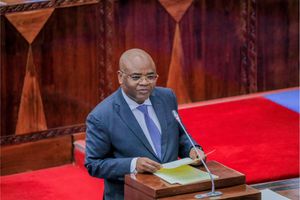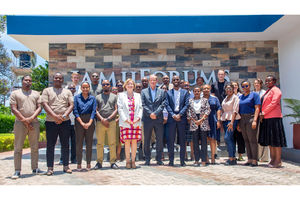Kenya allows EAC nationals free entry to work

Kenya's Prime Cabinet Secretary Musalia Mudavadi.
What you need to know:
- EAC citizens will only need to provide proof of citizenship.
Kenya has introduced a ‘Class R’ work permit, allowing East African Community (EAC) nationals to obtain the document free of charge.
According to a gazette notice issued on Tuesday by Prime Cabinet Secretary Musalia Mudavadi, who doubles as Foreign Affairs minister, EAC citizens will only need to provide proof of citizenship.
Kenya joins Rwanda as the other EAC partner state that has abolished work permit fees for East African nationals.
Nairobi has also revised the nomad work permit fees, reducing the minimum annual income requirement for applicants from $55,000 to $24,000. This change makes it easier for international workers to live and work remotely from Kenya.
The changes are contained in the Kenya Citizenship and Immigration (Amendment) Regulations, 2024.
Mr Mudavadi told The EastAfrican that Kenya has revised the work permit fees to style itself as a multilateral hub.
“Apart from the UN, the World Bank office in Nairobi is the largest outside Washington, DC. So it’s the hub for the whole continent. Our policy is to leverage these opportunities. That explains one of the classes of work permit in the changes,” he said.
The new Class R permit is meant to harmonise fees for citizens of the EAC “to allow the EAC integration to work better.”
“Uganda and Tanzania have been doing it and have been ahead of us,” Mr Mudavadi said. “Now, we are not charging EAC nationals. We have taken corrective measures on that.”
Nomad visa
The new permit combines investors, skilled workers, traders and farmers, under a single, simplified category as defined in the EAC Common Market protocol.
The nomad visa, Mr Mudavadi said, is for those in the digital space.
“There are about 40 million individuals globally who are actually operating in that space. The young Kenyans are very techn-savvy and we want to give them an opportunity and a platform to operate and make this truly an ICT hub,” he said.
“We have already established the virtual university at Konza. So, we are in a way putting together the building blocks that will make use of ICT more lucrative and inclusive for people of Kenya and those who want to live here.”
A major change introduced by the regulations is the introduction of a new permit category, Class P, for employees of international institutions such as the UN, diplomatic missions and international NGOs. The permit fee for this class is $200, plus an annual fee of $1,000.
Professionals working for religious or charitable organisations will pay up to Ksh1 million.
Now all eyes are on Tanzania, DRC, Somalia, Burundi, and South Sudan, which still charge East Africans for work permits.
Tanzania charges $2,000 for a Class A, a residence permit issued to foreigners intending to invest in prospective areas such as industry, mining, forestry, social services and business.
A Class B permit is issued to expatriates in rare professions and costs $1,500, while students, researchers, volunteers and missionaries get a Class C permit for $500.




